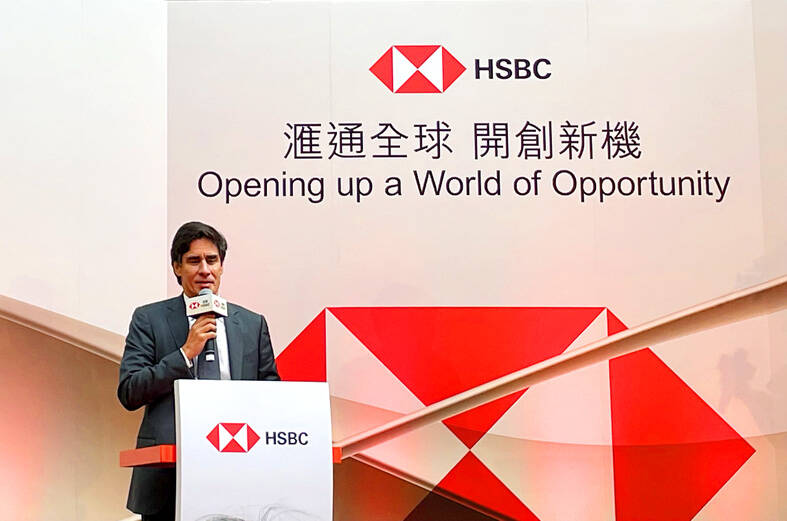HSBC Bank Taiwan Ltd (滙豐台灣商銀) on Friday launched a wealth management center in Taipei, and plans to open centers in Taichung and Taoyuan next year, as the bank aims to grow its wealth management business, despite interest rate increases.
The establishment of the new wealth management centers is estimated to cost the bank about NT$100 million (US$3.3 million), HSBC Taiwan said, adding that it would continue investing in employees, service platforms and financial technology.
“We are fully committed to Taiwan, as it is an important market in Asia and we aim to be the leading wealth management bank,” HSBC Holdings PLC wealth and personal banking chief executive Nuno Matos told a news conference in Taipei on Friday.

Photo: CNA
“Taiwan’s high-net-worth customers make up about 10 percent of Taiwan's population,” he said.
The wealth management client base in Asia showed twofold growth year-on-year last year, and the number of HSBC Taiwan’s high-net-worth clients grew 40 percent, while its assets under management rose 22 percent from a year earlier, Matos said.
While many local banks’ wealth management businesses have reported decreasing net fee incomes in light of volatile financial markets amid global central banks’ rate hikes, HSBC Taiwan saw its pre-tax profit from wealth management and personal banking increase by 70 percent annually for the first half of this year, company data showed.
HSBC managed to sustain positive growth, as it has gained a larger market share by providing comprehensive products and customized services, Matos said.
As the interest rate hikes adopted by Taiwan’s central bank are softer than those of its global peers, the monetary tightening has had a milder impact on the markets, he added.
The central bank on Thursday raised its key interest rates by 12.5 basis points, marking the fourth consecutive quarter of rate hikes. Since March, the bank has raised rates by 62.5 basis points, while the US Federal Reserve has boosted rates by 425 basis points.
HSBC Taiwan is expected to show strong growth in business performance through next year, Matos said.

Hon Hai Precision Industry Co (鴻海精密) yesterday said that its research institute has launched its first advanced artificial intelligence (AI) large language model (LLM) using traditional Chinese, with technology assistance from Nvidia Corp. Hon Hai, also known as Foxconn Technology Group (富士康科技集團), said the LLM, FoxBrain, is expected to improve its data analysis capabilities for smart manufacturing, and electric vehicle and smart city development. An LLM is a type of AI trained on vast amounts of text data and uses deep learning techniques, particularly neural networks, to process and generate language. They are essential for building and improving AI-powered servers. Nvidia provided assistance

GREAT SUCCESS: Republican Senator Todd Young expressed surprise at Trump’s comments and said he expects the administration to keep the program running US lawmakers who helped secure billions of dollars in subsidies for domestic semiconductor manufacturing rejected US President Donald Trump’s call to revoke the 2022 CHIPS and Science Act, signaling that any repeal effort in the US Congress would fall short. US Senate Minority Leader Chuck Schumer, who negotiated the law, on Wednesday said that Trump’s demand would fail, while a top Republican proponent, US Senator Todd Young, expressed surprise at the president’s comments and said he expects the administration to keep the program running. The CHIPS Act is “essential for America leading the world in tech, leading the world in AI [artificial

DOMESTIC SUPPLY: The probe comes as Donald Trump has called for the repeal of the US$52.7 billion CHIPS and Science Act, which the US Congress passed in 2022 The Office of the US Trade Representative is to hold a hearing tomorrow into older Chinese-made “legacy” semiconductors that could heap more US tariffs on chips from China that power everyday goods from cars to washing machines to telecoms equipment. The probe, which began during former US president Joe Biden’s tenure in December last year, aims to protect US and other semiconductor producers from China’s massive state-driven buildup of domestic chip supply. A 50 percent US tariff on Chinese semiconductors began on Jan. 1. Legacy chips use older manufacturing processes introduced more than a decade ago and are often far simpler than

Gasoline and diesel prices this week are to decrease NT$0.5 and NT$1 per liter respectively as international crude prices continued to fall last week, CPC Corp, Taiwan (CPC, 台灣中油) and Formosa Petrochemical Corp (台塑石化) said yesterday. Effective today, gasoline prices at CPC and Formosa stations are to decrease to NT$29.2, NT$30.7 and NT$32.7 per liter for 92, 95 and 98-octane unleaded gasoline respectively, while premium diesel is to cost NT$27.9 per liter at CPC stations and NT$27.7 at Formosa pumps, the companies said in separate statements. Global crude oil prices dropped last week after the eight OPEC+ members said they would